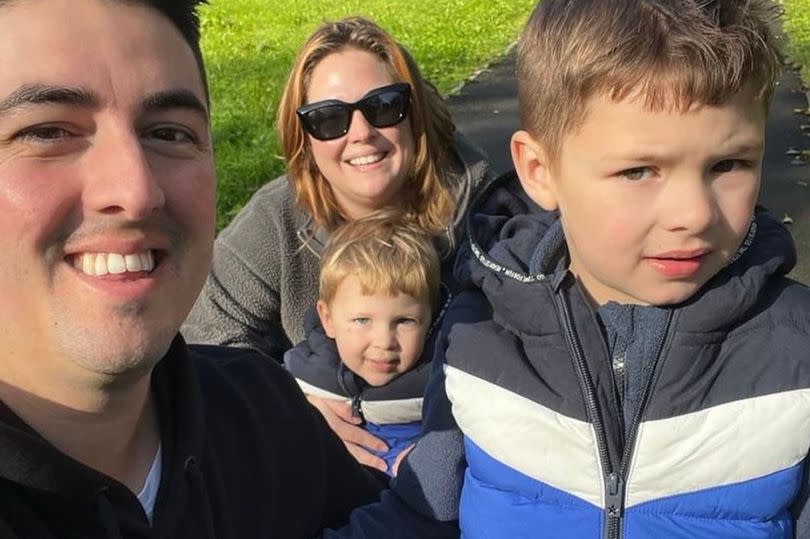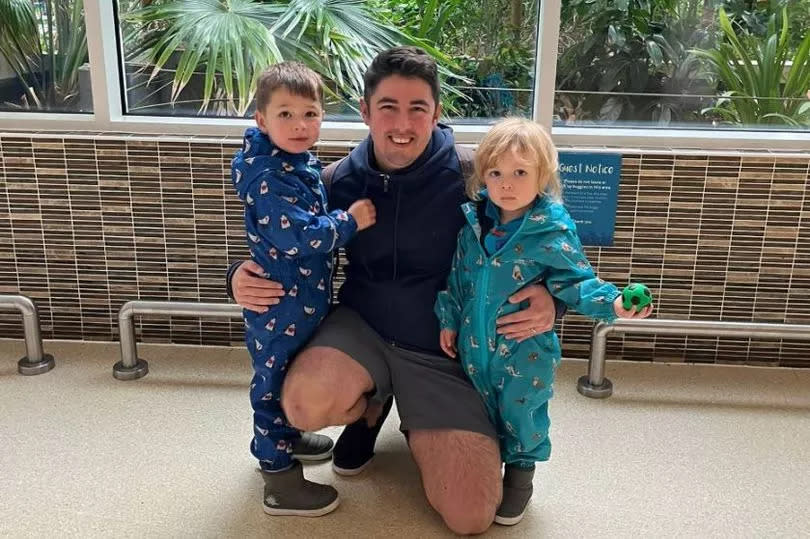'Our child is non verbal and it is taking years to get help'

A mother waited over four years to get a diagnosis for her toddler on the Welsh NHS.
Hollie Smolinski is a mother of two children with ASD (autism spectrum disorder). Her sons are called Oliver aged five and Oscar aged four. She had to wait three years for an ASD appointment and then another year and half for a diagnosis for Oliver. She is currently repeating the process for Oscar.
Hollie, 36 and her partner Daniel 34 are a stark example of how the long waits in the Welsh NHS are affecting children. According to the latest data first reported in the Will Hayward Newsletter, almost 2,000 children are waiting over two years for an appointment and this figure has barely changed in six months .Over 3,500 kids are waiting over a year for their first appointment and an astonishing 7,000 children have waited over a year for an appointment.
Read more: The moment an autistic man saved a dog from drowning
The couple, who live in Beddau in Rhondda Cynon Taff, have been battling to get a diagnosis in order to be able to access specialist support. They have spoken to WalesOnline to highlight the issues they have faced and to advice parents in a similar situation.
There are an estimated 700,000 autistic people in the UK (around 1 in 100 people). Autism is a spectrum, which means that autistic people have varying and often complex support needs. Some people may have an accompanying learning disability and require 24-hour care, while others simply need things like clear communications and small adjustments at school or work. You can see a piece where autistic people explained what it is like to be autistic here.
Oliver’s story
When a child is born there are certain check ups a different stages to check the child is hitting their milestones At 18 months Hollie’s eldest son Oliver was not hitting milestones- in that he was not talking.
He turned two in 2020 and the health visitor sent them a letter that June saying he was being referred for an ASD assessment. From then it was a waiting game, in the meantime they did speech and language therapy and play therapy which is a technique to bring out speech in a child
Shockingly they had to wait three years for an appointment and then another year and a half for a diagnosis for Olivber and their second child Oscar is now also waiting for an appointment.
Before a diagnosis can be put forward a panel has to be assembled- they write to the school and nursery and anyone who would have that sort of contact with a child and could assess their development.
Hollie said: “We needed the diagnosis and panel to get into the right schools. Our oldest son now has a diagnosis for ADL and ADHD.
“We knew Oliver would not manage at a mainstream school due to the level of support he needed. We met with a mainstream school but they could not support it without more funding. A lot more responsibility has been shifted over to the teachers.”
Hollie was given a letter in lieu of official statement and was given a place in an assessment and observation class for a year. This all happened while waiting for an official diagnosis
“Oliver was in one of these special schools for two years before the diagnosis came in,” Hollie explained. “I knew Oliver would not manage at a mainstream school due to the level of support he needed.

Ms Smolinksi used to work in car insurance but gave up her job because her children needed one to one care and finding childcare that can offer one to one care during the holidays is really difficult
She said: “Waiting for the diagnosis was so difficult emotionally. When I was told the waiting list had gone from 18 months to 24 months and I started crying on the phone. There is a lot of emotional strain, it was really stressful.”
Hollie said that she feels very lucky that her and her partner have such a strong relationship because it can be “so lonely”.
“When your child is ill and non-verbal it is heartbreaking when they cannot communicate with you what is wrong,” she explained. “They are generally very happy kids- they love soft play and their grandparents.”
The couple have to have a strategy and contingency plan for these events though- what to do in case of a meltdown.
Waiting lists in Wales have been stubbornly high for years. Though the pandemic had an effect, the lists were heading in the wrong direction before Covid.
This graph shows the number of children currently on Welsh waiting lists:
Some parts of Wales have longer waiting lists than others but all of them have seen waiting times stagnate and remain very high. This graph shows the number of people waiting over two years for an appointment (there are almost none in England):
This graph shows the number of people waiting over one year:
How Hollie and the family manage their tough situation
Hollie was full of praise for the Pontypridd based not-for-profit Role Play Lane Centre which is a play centre which also holds educational classes and well being sessions.
She said: “Role Play Lane has been really good- especially for meeting parents in a similar situation. There is a really nice community there. Some people are so lost they need places like this to get through it”.
Hollie told WalesOnline that she finds the most support from other parents there because there is “no judgement” and it is a “safe space”. When the children go they can be themselves.”
Advice for other parents:
The pair have the following advice for other parents:
Just keep an eye out for when your children are not hitting those milestones.
Please talk about it with other parents that are going through the same thing.
Children do not know any different but mums and dads do.
Parents need to be the people that push.
The NHS has been amazing and teachers have been amazing - but the Government needs to get themselves in gear.
A Welsh Government spokesman said: “We are committed to tackling long waiting times and increased demand for neurodivergence services. Following a review by the NHS Executive, each health board has a comprehensive set of recommendations highlighting how they can make further improvements.
“We have invested £6m and the Neurodivergence Improvement Programme has been set up to improve access to pre-diagnostic support for people with autism, ADHD, and other neurodivergent conditions.”
A spokesperson for Cwm Taf Morgannwg UHB said: “While we recognise that the waiting times for diagnosis remain significant across Wales, we are working with our partners on a wide-range of new initiatives to meet growing demand for neurodiversity services, both pre and post-diagnosis.
“Working with our local authorities in CTM, education services and with the community and third sector, over the past year, there has been additional resource allocated to complete more than 300 extra neurodiversity assessments for children and young people. Community connectors have been established in each local authority area with the purpose of providing local advice and support.
“There are also waiting well resources available to help patients and their families while they wait for their diagnostic assessment.”

 Yahoo News
Yahoo News 
